AMEGAS OVERCOMES THE DIFFERENTIAL-PRESSURE DIFFICULTIES INHERENT IN ITALY’S HOT SUMMERS WITH THE INSTALLATION OF A NEW EBSRAY
® RC40 SERIES REGENERATIVE TURBINE PUMP
By Jean-Marc Bernard
Quick Facts
Company: AmeGas S.p.A. Location: Naples, Italy Market: Autogas
Distributor: GasTech Service s.r.l., Bari, Italy
Challenge: Identify and deploy a pumping technology that can handle the high differential pressures that are required to effectively dispense Autogas during Italy’s warm summer months
Solution: Ebsray
® RC40 Series Regenerative Turbine Pumps
Introduction
Italy and Autogas, the name given to liquid petroleum gas (LPG) that is used as a motor fuel, have a relationship that dates back to the 1950s when the country became one of the first in Europe to introduce the fuel. Since then, the two have been good for each other, with Autogas growing into the world’s most commonly used alternative fuel, and Italy ranking as the second-largest Autogas market in the European Union.
This symbiotic relationship has been nurtured over the decades by the Italian government, which has used a series of fiscal incentives, such as favorable taxes on Autogas, traffic regulations and grants that encourage the conversion of gasoline- and diesel-powered vehicles into ones that run on Autogas. The result, as noted in the 2016 edition of the World LPG Association’s Autogas Incentive Policies report, is that Autogas now accounts for more than 40% of LPG consumption in the country and 5% of motor-fuel demand. There are now nearly 4,000 Italian service stations offering the fuel, or 20% of the country’s retail fueling sites.
“Autogas is becoming more and more important in Italy,” explained Salvatore Piccolo, who for 15 years was the Autogas Manager for Assogasliquidi, Italy’s national LPG association. “When you open a new filling station you must deliver LPG, CNG or LNG in accordance with an Italian decree that mirrors the European alternative-fuels directive.”
More significantly, Piccolo is currently the Technical Director for AmeGas S.p.A., a Naples, Italy-based subsidiary of Mexican energy giant Zetagas Group. AmeGas recently entered into Italy’s retail-fueling market in a significant way with the purchase of 250 Esso-branded service stations that were previously owned and operated by ExxonMobil. Sixty percent of those stations, or 150 sites, offer Autogas.
“Autogas is important to us because it is perceived in Italy as an ecological fuel, so it is getting more and more market share because of the environmental problems we face in Italy,” Piccolo continued. “AmeGas represents about 1.5% of the total LPG market in Italy, selling more than 45 million liters (11.9 million gallons) each year through our filling stations.”
The Pressure Is
On While Autogas has been a staple in the Italian motor-fuel market for more than six decades, the Autogas that is dispensed today is not your grandfather’s Autogas. A typical Autogas mixture consists of 60% butane and 40% propane. However, Italian legislation is now calling for a mixture that has a higher percentage of propane since it burns cleaner than butane.
This change in formulation also changes the way that Autogas needs to be handled and dispensed, especially in the excessively hot summer months that are common in southern Italy, where many of AmeGas’ service stations are located. Higher concentrations of propane in Autogas combined with high summer temperatures will increase the internal pressure in the vehicle’s fuel tank to a level that forces the pressure in the storage tank to have to increase, with as much as a 10 to 14 bar (145 to 203 psi) differential pressure between the fuel and storage tanks needed in order for the fueling process to commence. If the proper differential pressure is not attained, it becomes more difficult for the pump at the Autogas dispenser to transfer the fuel into the vehicle’s tank, leading to slow filling rates, or even the interruption of service.
This puts a lot of, no pun intended, pressure on the pumps that are used to dispense Autogas. They must be able to reliably and consistently produce the higher differential pressures that are needed to keep the fuel flowing.
“Our stations are concentrated in the south of Italy, so with high temperatures, especially in the summer months, we need pumps that can guarantee a very high differential pressure to avoid any problems when refueling the cars,” said Piccolo.
Discovering The Proper Pump
AmeGas intends to eventually outfit all of its recently purchased ExxonMobil stations with Autogas, so the company has been searching for a pump that can deliver the high differential pressures that are required. For a suggestion and a solution, Piccolo turned to Oil Sistems, a Volla, Italy-based designer and fabricator of fuel-dispensing systems for the Italian service-station market.
Francesco Quintaluce, Technical Manager for Oil Sistems, was quick to recommend regenerative turbine pump technology from Ebsray
®, Cromer, Australia, which is a product brand of PSG
®, Oakbrook Terrace, IL, USA, a Dover company. Specifically, Quintaluce had previously had success with Ebsray’s RB10 model in Autogas applications. So, after receiving approval from AmeGas, he was prepared to place an order with GasTech Service s.r.l., Bari, Italy, a leading distributor of Ebsray pumps in Italy.
“We had some previous experience with Ebsray pumps and we knew very well the features of this kind of pump,” said Quintaluce.
“We have a good relationship with GasTech Service, so we turn to them for all of the equipment we need for our installations. Ebsray pumps have low maintenance and easy installation, and we had previously used the RB10 pumps.”
This time, however, Giorgio Gotta, General Manager of GasTech Service, had another suggestion: Ebsray’s recently released RC40 model. The highly efficient RC40 pumps are able to use a flanged motor, resulting in cost savings, and feature a single-stage impeller and a unique three-port design with two discharge ports for installation flexibility. But most significantly for AmeGas, they can deliver differential pressures up to 14 bar (200 psi) with flow rates up to 200 L/min (52.8 gpm) at motor speeds up to 3,500 rpm.
Additionally, the cartridge-designed mechanical seals and bearings can be easily replaced without having to disconnect the pump from the piping. All that’s required is to disconnect the motor, remove the cover, expose the pump shaft, remove the cartridge with the mechanical seal and replace it with a new one.
“With all other pumps, you have to remove the pump from the platform just to replace the mechanical seal, but the RC40 doesn’t require this because we can replace the mechanical seal with the pump installed directly on the platform, with very little time needed for replacement,” Quintaluce said. “This helps the RC40 meet our requirements for high differential pressure, good flow capacity, easy maintenance, easy installation, and also it comes at a good price, which is very important for us.”
In addition to the high differential pressure, the flow rate is also important to AmeGas because Piccolo said the company hopes to offer four Autogas-fueling positions at many of its Esso sites and the high flow rates that are produced by the RC40 pumps will help make this possible.
Conclusion
So, in late 2017 history was made when AmeGas installed an Autogas-dispensing system at its service station in Sabaudia, about an hour south of Rome. This became the first site in Italy to be equipped with an Ebsray RC40 Series Regenerative Turbine Pump.
“For our filling stations, we want the best equipment and we have specific requirements for that equipment,” Piccolo said. “The Ebsray RC40 pumps can satisfy us from the aspect of differential pressure and flow rate, so we are very happy with this choice.”
About the Author:
Jean-Marc Bernard is the EMEA – Senior Market Manager LPG Europe for Ebsray® and PSG® and can be reached at +33 1 55 39 07 40 or Jean-Marc.Bernard@psgdover.com. Ebsray is a leader in the design and manufacture of regenerative turbine and positive displacement pump technologies, including sliding vane and gear, for a wide range of industrial applications. Founded in Brookvale, Australia, Ebsray has grown into a leading supplier of specialized pumps for use in a wide array of industries, including chemical, petroleum liquids, mining, food and beverage, pulp and paper, municipal and utility services, and paint and coatings. Ebsray is a product brand of PSG®, a Dover company, Oakbrook Terrace, IL, USA. PSG is composed of several leading pump brands, including Abaque®, Almatec®, Blackmer®, Ebsray®, EnviroGear®, Griswold™, Mouvex®, Neptune™, Quattroflow™, RedScrew™ and Wilden®. For more information on Ebsray or PSG, please go to psgdover.com.
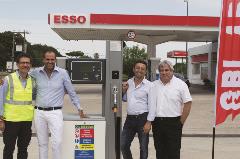
The collaborative effort between Giorgio Gotta of GasTech Service, from the left, Salvatore Piccolo of AmeGas, Francesco Quintaluce of Oil Sistems and Jean-Marc Bernard of Ebsray
® and PSG
® has resulted in AmeGas becoming the first fuel retailer in Italy to use a new Ebsray RC40 Series Regenerative Turbine Pump in its Autogas-dispensing operations.
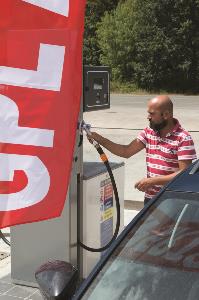
Driven by an Italian law that mandates increased production and consumption of alternative fuels, the country’s Autogas market has grown to 5% of the motor-fuel pool with around 4,000 retail sites now offering the fuel.
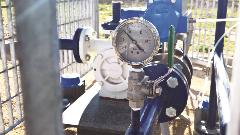
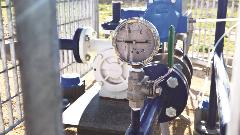
A key to uninterrupted Autogas dispensing in Italy’s warm summer months is utilizing a storage-tank pump that can create enough differential pressure between it and the vehicle’s fuel tank. At rest, the Autogas storage tank at AmeGas’ site in Sabaudia has a pressure of 8 bar (116 psi), left photo, but when fueling begins, the Ebsray
® RC40 Series Regenerative Turbine Pump can create 21 bar (305 psi) of pressure, which is more than enough to facilitate the fueling process.
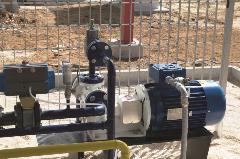
Ebsray
® RC40 Series Regenerative Turbine Pumps feature a motor that is smaller than competitive pumps, resulting in energy-cost savings. Despite the smaller motor, the RC40 pump will easily, reliably and economically produce differential pressures up to 14 bar (200 psi) with flow rates up to 200 L/min (52.8 gpm).